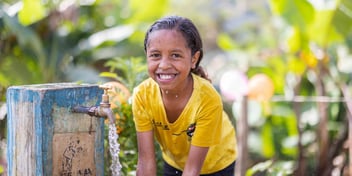Walk for Water event to put the focus on handwashing and hygiene
Coinciding with this year’s National Water Week (19-23 October), WaterAid is set to launch its 12th annual Walk for Water fundraising event, inviting all Australians to walk in solidarity with those required to walk long distances to collect water.
WaterAid is a leading global water, sanitation and hygiene (WASH) NGO that focuses on the key issues of universal access to safe water, decent sanitation and good hygiene.
WaterAid Chief Executive Rosie Wheen said that while Walk for Water is entering its 12th year, the importance of WaterAid’s mission has come into sharp focus as a result of the COVID-19 pandemic.
“All of a sudden the world has realised that one of the key lines of defence against so many diseases, including COVID-19, is handwashing. How can families at home, children at school, and health workers in healthcare centres wash their hands if they don't have access to water?” Wheen said.
“This year, like everyone else, we've had to adapt to the impacts of COVID-19. This year’s event will be a virtual fitness and fundraising challenge and people can participate from anywhere around the world.
“The challenge is to do one hour of exercise each day in October during National Water Week. It can be walking, running, cycling, or anything else the participant feels is a challenge for them.”
"Reimagining our water future"
Wheen said the challenge has been devised to promote discussion and raise awareness around the global WASH crisis, but also to promote health and wellbeing during the unprecedented COVID-19 pandemic.
“What I love about this year’s challenge is the aspect of thinking for yourself, because we're wanting to raise awareness and stimulate thinking about the challenges for people in developing countries that don't have access to safe water close to home,” she said.
“When people sign up to challenge themselves with a daily walk, run or ride, they're raising awareness for WaterAid's work, which responds to the fact that one in ten people in the world don't have access to safe water close to home.
“I think all of us have become aware of how important taking care of ourselves and our wellbeing is at the moment. So, a bit of extra exercise and motivation is a good way to do that. And of course, it's also about funds for the vital work that WaterAid does.”
Wheen said National Water Week is an excellent time for Walk for Water, as this year’s theme connects directly with WaterAid’s work.
“The theme of Water Week is ‘re-imagining our water future’. I'd love for us to be re-imagining water, and start to prioritise these basic services for people that are being left behind,” Wheen said.
“Access to water is a key human right. It’s been 10 years since water and sanitation were declared as human rights, and I think it's a real wake up call for us to reimagine our world now and really leverage the reality of COVID-19 to galvanise commitment to universal access to water.”
Wheen said the goal to ensure universal access to clean water, decent sanitation and good hygiene is a definitely a big challenge.
“There is a big gap to achieving universal access to water, but if you a look at countries like Singapore, South Korea and Thailand, they have achieved it within a generation, which is something I take hope from all the time,” she said.
“WaterAid is working in nearly 30 countries around the world, working alongside governments to ensure they recognise the issues they face and aid in addressing WASH challenges in those countries.
“We also work alongside local partners and communities on the ground to provide access to water, sanitation and hygiene. This is crucial work. For example, diarrhoea is the second biggest killer of children in developing countries and a key prevention of this is access to safe water, sanitation and hygiene.”
Transforming lives
Wheen said WaterAid’s work is about access to water, sanitation and hygiene, but it is also about how this can transform the lives of the poorest people in the world.
“The global WASH crisis impacts women and girls particularly. We know the burden of collecting household water in many parts of the world falls more on women and girls. And so WaterAid’s work doesn’t just improve people’s health, it also transforms their lives,” she said.
“If a girl isn't spending hours of her time collecting water, she can instead be spending that time at school. And of course, education unlocks so much more for young women. It’s about water, but it’s also about supporting livelihoods as well.”
Sign up for the WaterAid’s 2020 Walk for Water here. For more information on National Water Week, visit the Australian Water Association site here.


